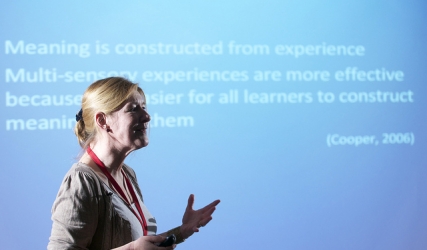I remember back in the day when I was taking my driving test – third time’s a charm. After finally passing, my Mum turned around and said to me: “It’s only after passing your test, you truly learn how to drive.” As usual, she was right. She’s like Yoda.
So, you want to be a teacher?
Teaching ESL is similar in this way. Taking the TEFL – or equivalent – is a constant learning curve. You get taught everything you need to know: grammar, teaching concepts and ideas, what to expect in a classroom, how to help students… But you never really learn how to teach until after your initial training and you’re stood there in your first set of classes. This is were the real learning begins.
Having a career as an ESL teacher isn’t as simple as just getting a TEFL degree and walking into a classroom and speaking English. You have to constantly be on your game, adapting, developing, changing, moving like the wind to see if your teenage students are really writing what they should be writing. Teacher development is a crucial and necessary path to take if you want to be successful.
Teaching you are, training you must
The reason for teaching English is different for different people. You may be taking a gap  year or a break between your studies/career search, you may want to live in a different country, you may have just fallen in to it, or you may have planned to do this all along. Whatever your reasons, whether you are only planning on teaching for a few months or a few years, constant training is important.
year or a break between your studies/career search, you may want to live in a different country, you may have just fallen in to it, or you may have planned to do this all along. Whatever your reasons, whether you are only planning on teaching for a few months or a few years, constant training is important.
Ideas and concepts are forever changing and it is important to be on top of these changes, and even better if you can add to them or develop your own concepts.
 Training is essential in this industry as there are always new and better ways of doing something and you don’t want to be caught in the past whilst all your colleagues are trying new and exciting methods of teaching they learnt from their friendly neighbourhood training facility.
Training is essential in this industry as there are always new and better ways of doing something and you don’t want to be caught in the past whilst all your colleagues are trying new and exciting methods of teaching they learnt from their friendly neighbourhood training facility.
I can hear some of the groans and sighs at this; more training, but I thought this was it?! Sorry young Padewan, teacher you are, but train you must. Hone those Jedi skills of English knowledge you should and better classes you will have. Okay, enough of the Yoda and onto a more serious note: constant training is essential and there are many things you can do to develop as a teacher.
Free (yes, free) Teacher development Seminars
There are numerous free ESL seminars which can be found in or around your city. Sign up for newsletters and e-mails to receive dates and times of when these seminars are on. I’ve been attending these free seminars in my city for the past five years, whenever I have some free time to go. They are an essential part of your teaching development. Not only do you get to hear from seasoned English teaching veterans and find out new and interesting ideas to help students, but it’s also a fantastic networking opportunity where you can find out about other schools and experiences from people in a similar position. Some seminars are great, some are not so great, but either way you always get something out of them and all you had to do was get out of bed that morning.
Everyone will have their favourite speaker at a seminar, and there’s one person who I always go and see. I’ve come out of a 2-hour seminar with enough notes to stop my dining room table from wobbling. He is insightful and has helped me tackle difficult classes and concepts successfully as well as giving me more confidence in the classroom to try new things. Find a speaker you like and can learn from, then make sure you attend their seminars as much as possible.
Not-so-free teacher development seminars
Yes, my wallet protests under these conditions as well. However, sometimes, you just have  to pay for good information and they are well worth it. The not-so-free seminars can be a full weekend thing or just a couple of hours on a Friday. However, as a teacher, they are invaluable and should be attended as and when you can. You will learn about exciting new concepts, ways to tackle problem areas in a classroom and things you’ve never even thought about. Again, it is a fantastic opportunity to network but this time with directors and schools a bit further afield, to keep those options open and learn from people with a lot of experience. If your budget simply will not allow for these paid seminars, and mine rarely does, then talk to your school director and see if they can help you out. Most of them will be thrilled you are taking your job seriously and want more training in this field and may contribute to your attendance.
to pay for good information and they are well worth it. The not-so-free seminars can be a full weekend thing or just a couple of hours on a Friday. However, as a teacher, they are invaluable and should be attended as and when you can. You will learn about exciting new concepts, ways to tackle problem areas in a classroom and things you’ve never even thought about. Again, it is a fantastic opportunity to network but this time with directors and schools a bit further afield, to keep those options open and learn from people with a lot of experience. If your budget simply will not allow for these paid seminars, and mine rarely does, then talk to your school director and see if they can help you out. Most of them will be thrilled you are taking your job seriously and want more training in this field and may contribute to your attendance.
Teacher development in your school
Training doesn’t necessarily mean having to attend seminars, as you can develop your teaching skills at the school you work in through challenging yourself. Yes, it’s easy to follow a book or syllabus, so try doing neither. You are your students’ best port of call for what they need vs. what they have to do. Take students out of the book and away from the syllabus and give them something they can really stick their teeth into. Developing your own syllabus and resources is an invaluable and essential skill for a teacher to have.
Where I work, each student has two teachers and some are repeating the same level/book, so planning is important. We don’t want the student to just repeat the same experience they had in a chapter or unit from the book, we need to find a new way of teaching it to them so that they can understand it better. This means regular meetings with teaching partners and adapting the way we teach. Even if you don’t have an official teaching partner at your school, don’t be afraid to ask other colleagues of their experience teaching this area. What advice could they give you? Bounce ideas off them. Two heads are always better than one.
Also, talk to your school director and ask them if they could organise meetings or mini seminars with some of their more experienced teachers. This is very useful and gives you all chance to address a common problem, teaching idea or concept and turn it on its head to make it more interesting and easier to understand. Your colleagues are a gold mine of information as everyone teaches differently. Talk to them, you never know what you might learn.
Master your skills
As with any degree or training, there is always another certificate you can add to your belt and ESL is no different. Once you have completed your TEFL – or equivalent – there are still other training qualifications you need to consider, such as the Trinity Dip TESOL or the DELTA. These are the Master’s degrees of ESL teaching and are necessary to advance your career and training as a teacher.
DELTA. These are the Master’s degrees of ESL teaching and are necessary to advance your career and training as a teacher.
They are not for the faint-hearted and require a lot of study and training – you are usually required to have been teaching with a TEFL certificate for at least two years before being allow to do the Trinity Dip TESOL or DELTA. However, they are the key to advancing your career and opening more doors to you in the long run.
They are expensive, up to around €2,700, and that’s not including the exam paper fee and books you need to purchase, but if this is what you want to do, it’s an investment worth making.
A word from our sponsors
As often is the case when I write blogs about things such as this, I like to talk to my colleagues and get feedback from them about their experience, so I talked to them about what they had learnt since finishing their initial TEFL training. A lot of the things they said were incredibly useful, especially from the ones who have been doing this for years and I thought it would be interesting to share some of their little gems of information here.
I asked them what they knew now that they wish they had known before, and one teacher told me that it was important to never stop treating your students like individuals, because no two classes are alike. Also, you need to constantly adapt your teaching style for the classroom and that only through years of experience do you gain the wealth, knowledge and skills to give you the necessary flexibility for this.
Subsequently, I asked them how attending seminars/conferences/training etc. helped them, and they told me that they were invaluable and a great way of learning new ways to teach, and also that the free workshops are great for newer teachers. However, after the two or three-year mark, there isn’t a lot out there unless it is provided by the school or you go for the TESOL diploma, DELTA or TESOL MA.
Finally, I asked them what the most important thing they had learnt since finishing their initial training was. They told me that a teacher must have the desire to reflect, improve and excel. No amount of training will make a person a good or a better teacher unless they truly love teaching.
And now, a word from me
I told you, you’ve got to be on your game. It’s something I’ve come to realise over the years  and when I look back I realise I have had the most fun developing myself and trying new things. The shelves in my classroom are bursting with folders of games and exercises, new concepts and ideas. I’ve had students I’ve taught for years and I can see my teacher development growth through them, see where they struggle and find a new way to combat it and make it easier. It’s more fun to be inventive that just redoing the same thing over and over again. Even if you’ve taught the target language 100 times, try something new.
and when I look back I realise I have had the most fun developing myself and trying new things. The shelves in my classroom are bursting with folders of games and exercises, new concepts and ideas. I’ve had students I’ve taught for years and I can see my teacher development growth through them, see where they struggle and find a new way to combat it and make it easier. It’s more fun to be inventive that just redoing the same thing over and over again. Even if you’ve taught the target language 100 times, try something new.
You never know, it might be a game changer.
By Morgan Dalzell







Leave A Comment